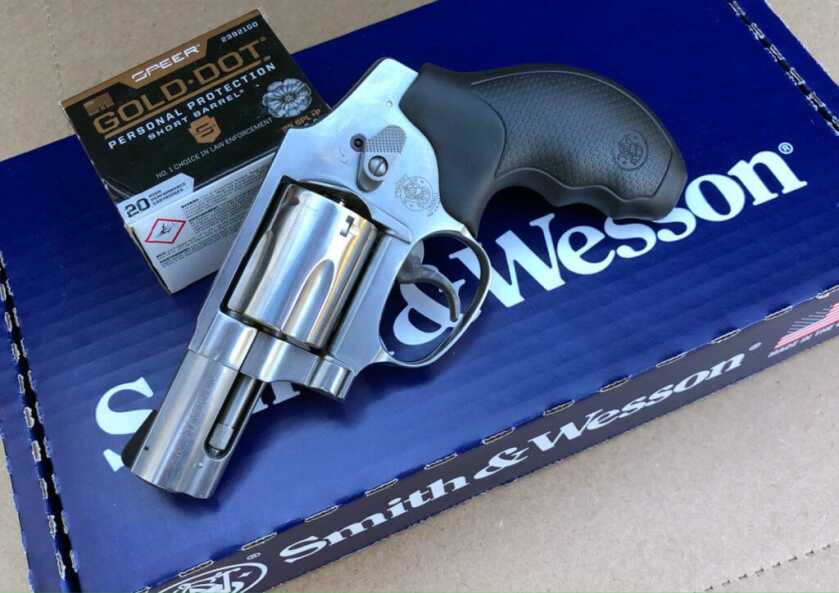
I recently wrote an evaluation of the S&W Model 649 Bodyguard. Some consider the humpback Bodyguard to be one of the ugliest pistols ever to come out of Springfield. If that is the case, then the Centennial series is the sleek and sexy roscoe that you want to take to the prom. After the article on the 649, it was only natural to evaluate the new Model 640.
History
The Centennial was introduced in 1952 to celebrate Smith & Wesson’s 100th year and remained in production until 1974. The sleek design features a fully enclosed hammer, a scalloped frame, and a grip safety. It was commonly referred to as a “lemon squeezer.” Interestingly, the original guns came with a small pin that could be used to deactivate the grip safety. The Centennial was chambered in .38 Special and was produced in both a steel frame and an alloy frame version. In 1957, when Smith & Wesson adopted model numbers, the Centennials became the Model 40 and Model 42 respectively.
The Model 40 and Model 42 had a large following. The totally enclosed hammer made the Centennials, especially Model 42 Airweight, perfect for concealed carry, particularly pocket carry. In extreme circumstances, the pistol could be fired from inside a pocket without the worry of the hammer becoming fouled. However, by 1974, sales had fallen off and the Centennials were cut from Smith’s lineup.
In 1989, Smith reintroduced the Centennial in an all stainless model. The Model 640 was a faithful reproduction but lacked the grip safety of the original Centennials. Chambered in .38 Special, the 640 was not rated for +P ammunition. The early Model 640 guns had a serial number prefix of “CEN”, a tribute to its family tree.
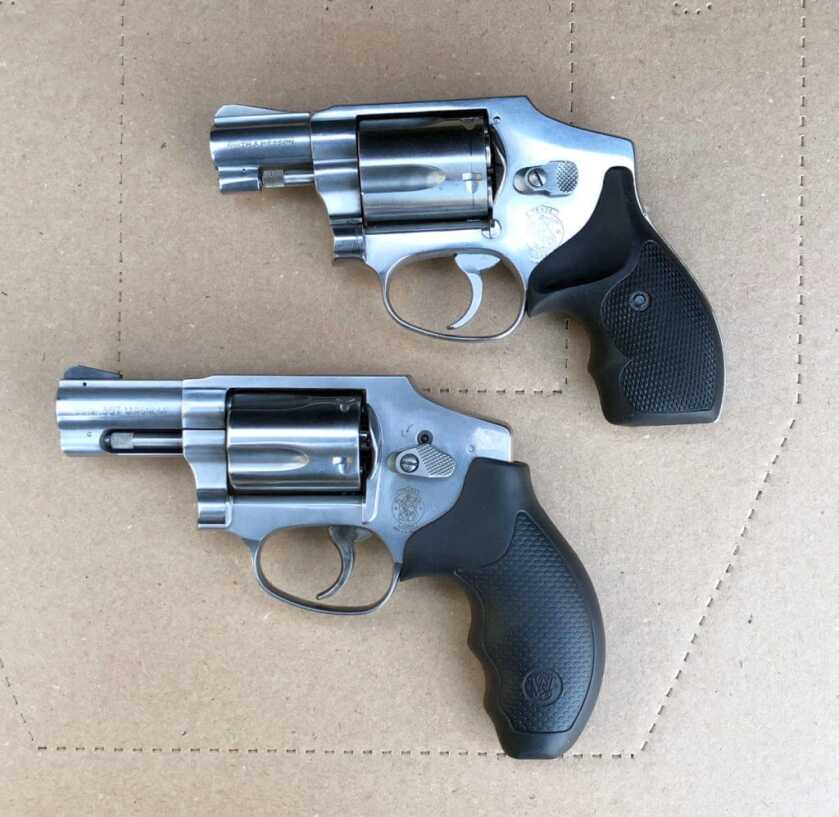
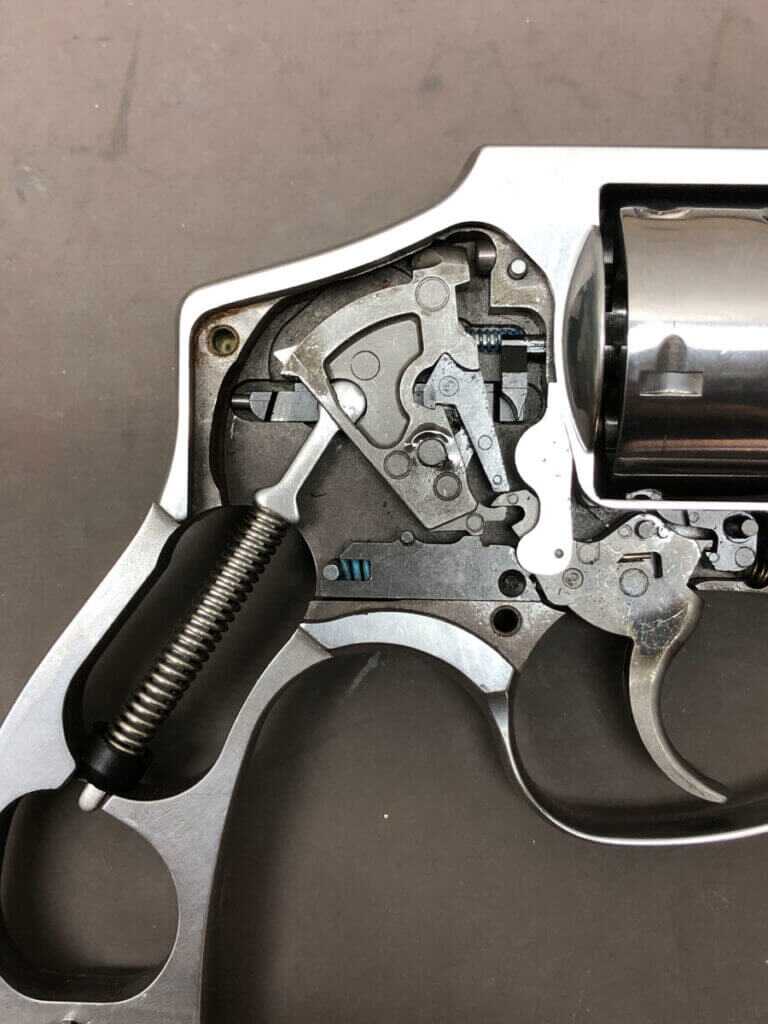
But perhaps the most significant Centennial, in terms of sales and popularity, came in 1990 with the introduction of the Model 642. The 642 was an alloy framed version of the 640 and was extremely popular. As with the original Model 640, the 642 was chambered for .38 Special but was not rated for +P. It featured a stainless steel barrel, yoke, and crane with an alloy frame that was clear coated. In 1993, Smith introduced the Model 442 which was a 642 with a black finish. In 1996, both models were upgraded with the strengthened J magnum frame and, for the first time, rated for +P loads. The 442/642 series is perhaps the most popular and most carried J-frame on the market today.
Enter the Magnum
In 1996, Smith introduced the Model 640-1 in .357 Magnum. The 640-1 was the first J-frame to be chambered in .357 Magnum. The frame was strengthened and slightly enlarged and a reinforced cylinder stop was machined as part of the frame. The 640-1 also featured a slightly longer barrel that measured 2 1/8”. The same year, Smith introduced the Model 649-3 Bodyguard and the Model 60-9 Stainless Chiefs Special, also chambered in .357 Magnum.
We received a Model 640-3 for this evaluation. The 640-3 weighs 22.1 ounces as compared to my original 640 which, with Uncle Mikes Boot Grips, weighs 21 ounces. By comparison, the alloy frame 442 and 642 come in at a mere 14.7 ounces. The finish on our pistol was void of blemishes, machine marks, or sharp edges. The actual finish is soft matte and the entire pistol is void of any offending sharp edges. The internal parts are a combination of steel and MIM parts. Like other .357 Magnum J-frames, the 640 features a 2.125” with a full underlug. This extended length allowed Smith to use a longer ejection rod for positive ejection of the longer magnum case.
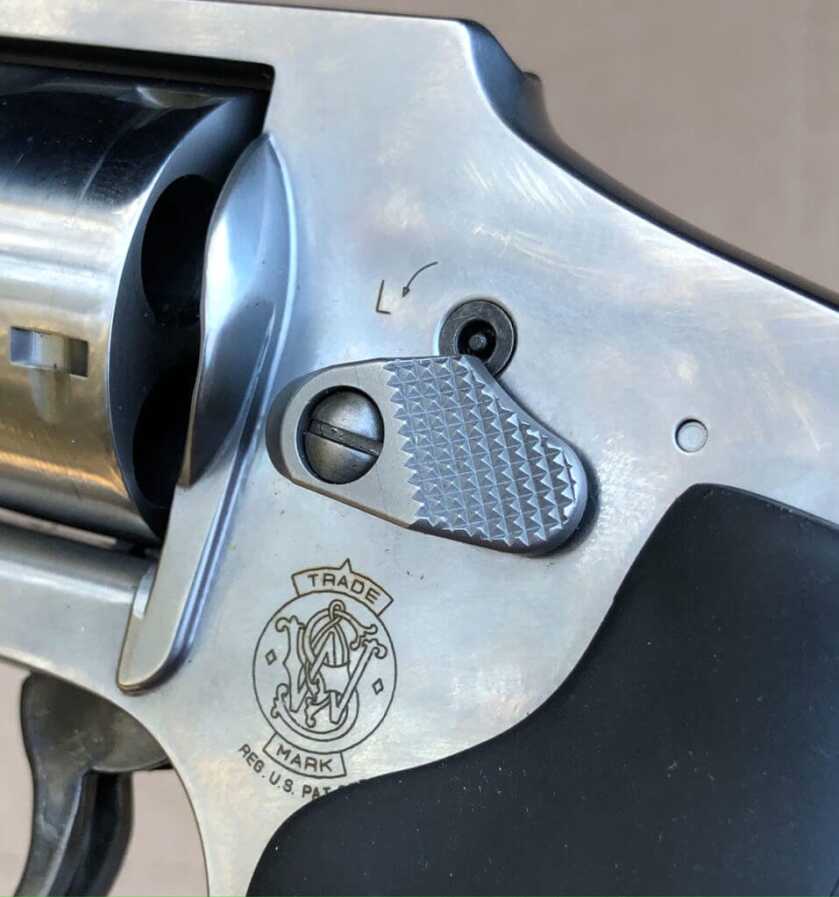
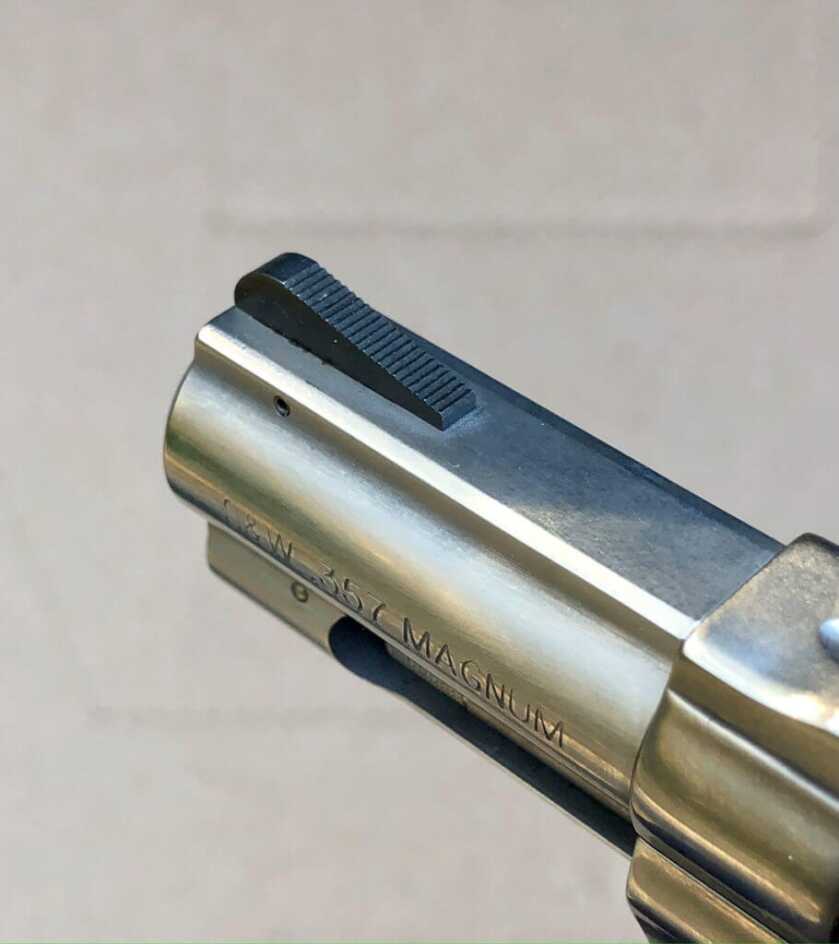
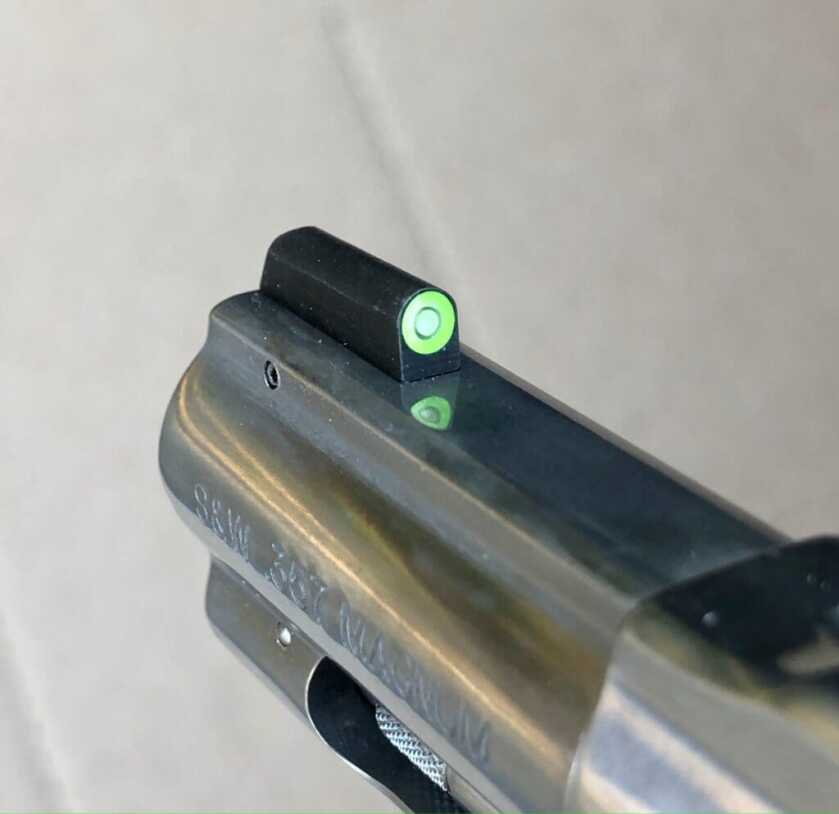
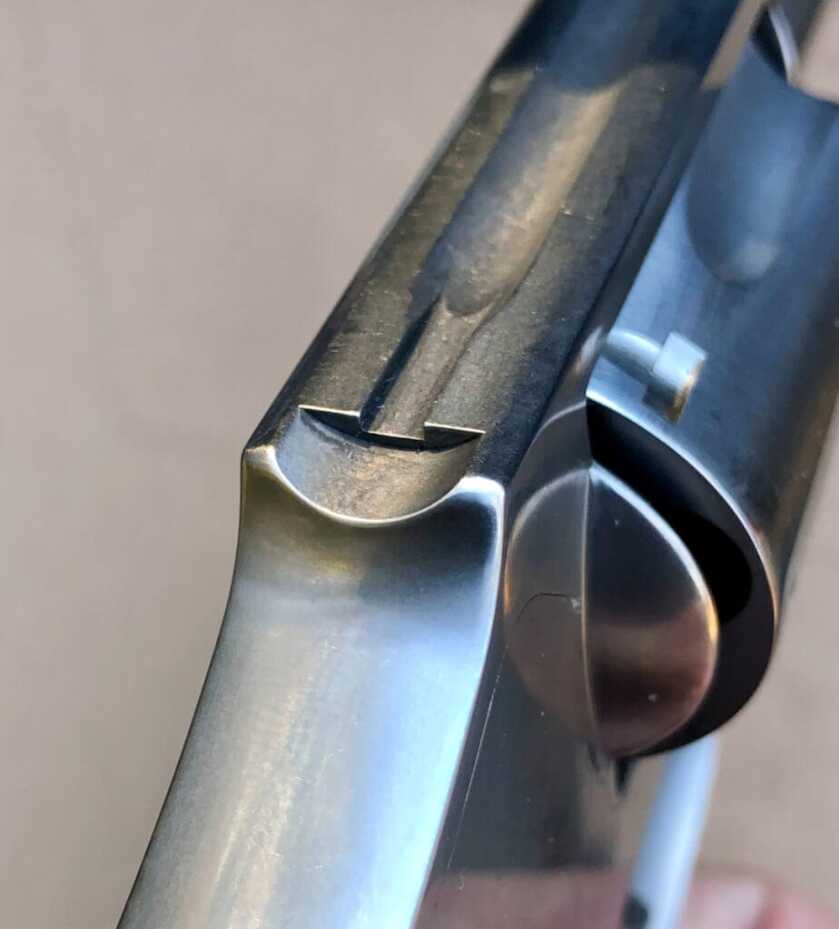
The smooth-face trigger features nicely radiused edges and the action was smooth and without any grit. Unfortunately, the action exceeded the 12 pound limit on my electronic trigger pull gauge. Like on the 649, the front sight on the 640 is a pinned black ramp. This makes replacement relatively easy. As shown in the photo, my preference is to replace the factory blade with a standard Tritium dot from XS Sights. The XS sight features a small Tritium insert that is surrounded by a larger dot. Colors include orange, yellow, green, and white. The installation requires drilling the new sight blade for the retaining pin.
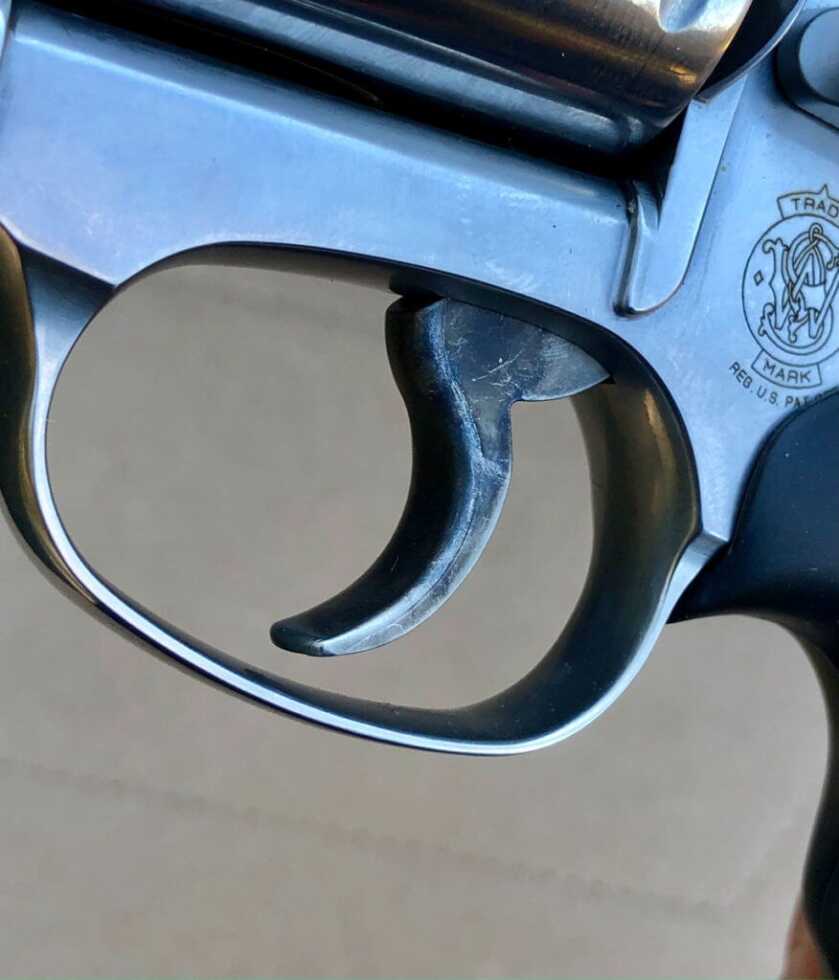
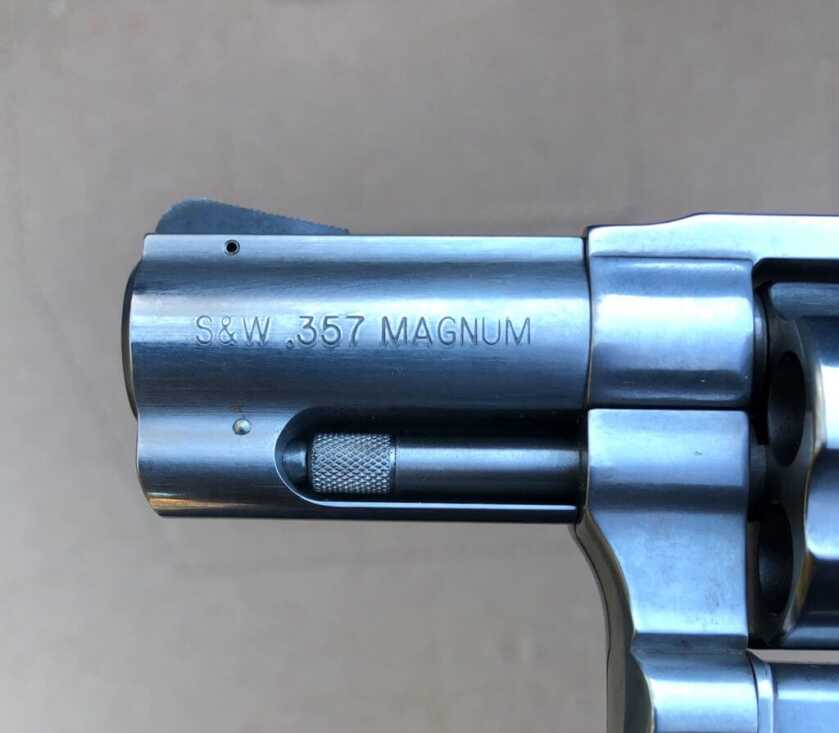
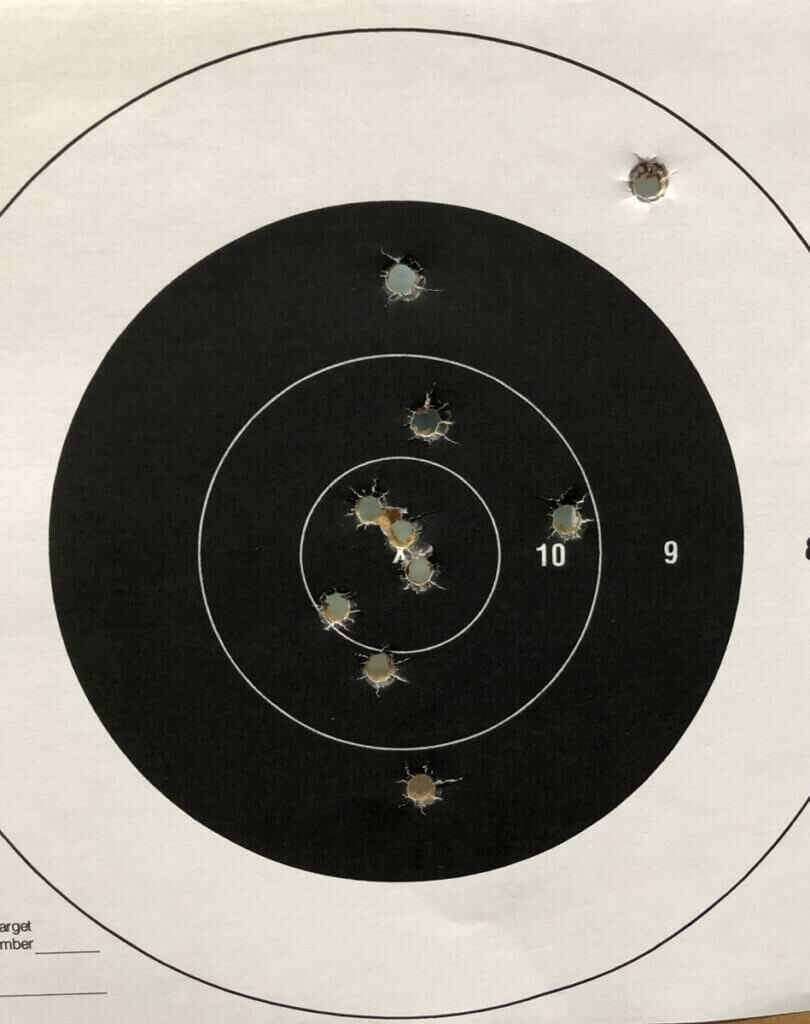
The Crimson Trace Advantage
Prior to hitting the range, I swapped out the factory stocks for Crimson Trace 405 Lasergrips. I have used CTC Lasergrips for many years and they are on any J-frame that I carry for personal defense. Like all CTC Lasergrips, the switch is located where the laser is activated by a proper firing grip. This intuitive design is essential in a critical or stressful confrontation. The design of the 405s is similar to a boot grip in that it fills the space behind the trigger guard but does not extend beyond the butt of the frame. The 405s also have a cushioned backstrap that works to reduce felt recoil. Crimson Trace 405 Lasergrip
Range Time
While the new 640 is chambered for .357 Magnum, the use of Magnum ammunition is, in my opinion, not practical. The recoil is best described as punishing! This translates into discomfort for the shooter and difficulty in both accuracy and follow-up shots. It is hard on the pistol. When I evaluated the Model 649, I shot a few rounds of Speer’s 135 grain Gold Dot Magnum Short barrel load. The purpose was to get a baseline, on velocity, as compared to the +P loads. The Gold Dot Magnum load averaged 1,196 fps. Given the barrel lengths are the same, I did not repeat the exercise with the 640.
It is important, especially with fixed sight revolvers, to ensure that your chosen load hits to point of aim. This is a step that is often overlooked by many shooters. Since the Model 640 is chambered in magnum, I was curious to see where the point of impact was with the selected .39 +P loads. At seven yards, I found that the Federal HST hit the point of aim and the Speer 135 Grain Gold Dot hit to point of aim while the 110 grain Hornady load hit approximately 2” low.
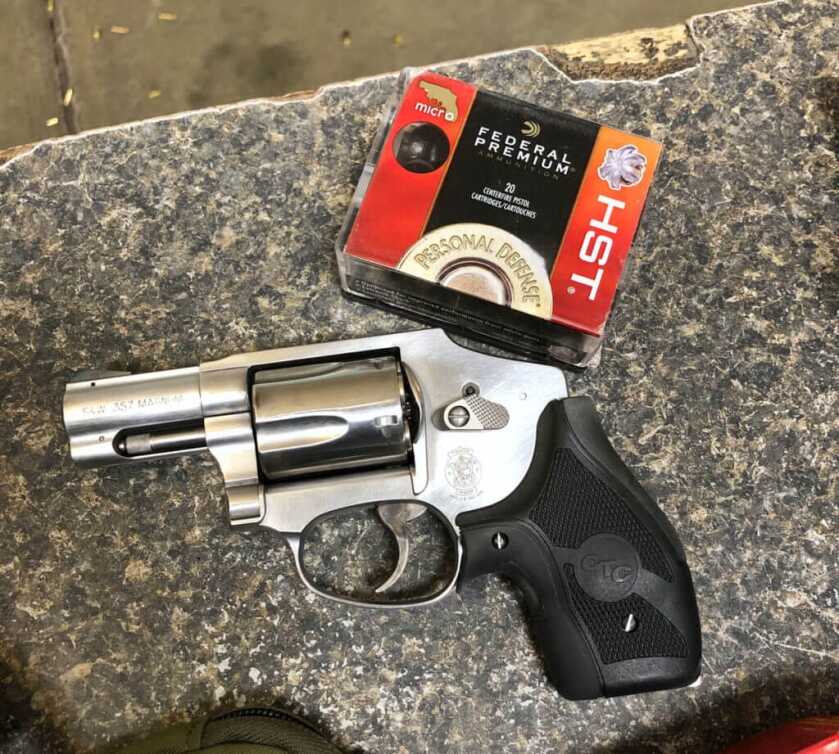
The below chart indicates the velocity readings from the loads we tested.
| Load | Average Velocity |
| Speer Gold Dot .38 Special +P 135 gr. GDHP Short Barrel | 899 |
| Federal .38 Special +P 130 gr. Micro HST | 828 |
| Hornady Critical Defense .38 +P 110 gr. FTX | 880 |
| Velocity 10 ft/Accuracy 20 yards |
One of my favorite drills is a modification of Ken Hackathorn’s 10-10-10 drill. I modified the drill for J-frames where I shoot 5 rounds, from 5 yards, in 5 seconds. This is repeated twice for a total of 10 rounds. The target used, for this drill, is the NRA bullseye. Scoring is done by the values on the target. I managed a score of 96 after losing one round in the 8 ring and two rounds to the 9 ring. I was pleased that I had four hits in the X ring. I did find that I had trouble tracking the black front sight on the black bullseye but the XS front sight will correct that issue.
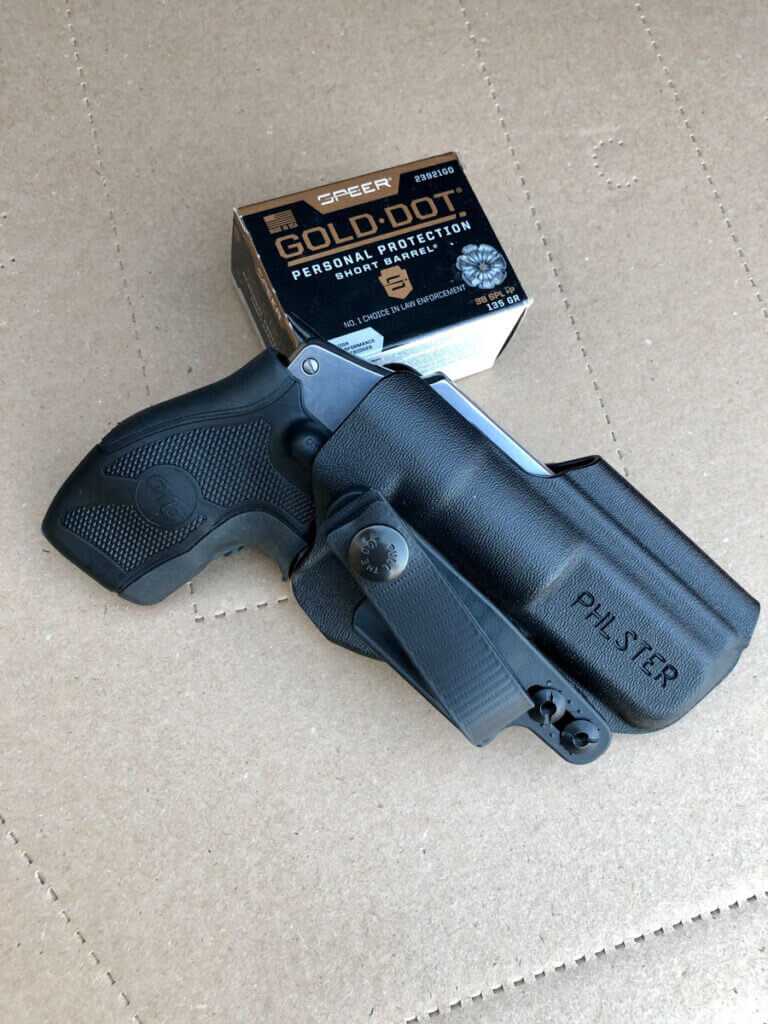
Daily EDC
For the past several years, my secondary gun has been a Model 642 that is carried in a Galco Ankle Glove. After ensuring that the new 640 was reliable, and determining what the best carry load was, I substituted it for my 642. Wearing it in the ankle rig, I hardly noticed the additional seven ounces or so. I attribute this to the excellent design of the Galco rig. Galco Ankle Glove
I also carried the 640 in an appendix position using a Philster City Special. I don’t normally carry AIWB but I found the City Special to work very well. Philster City Special
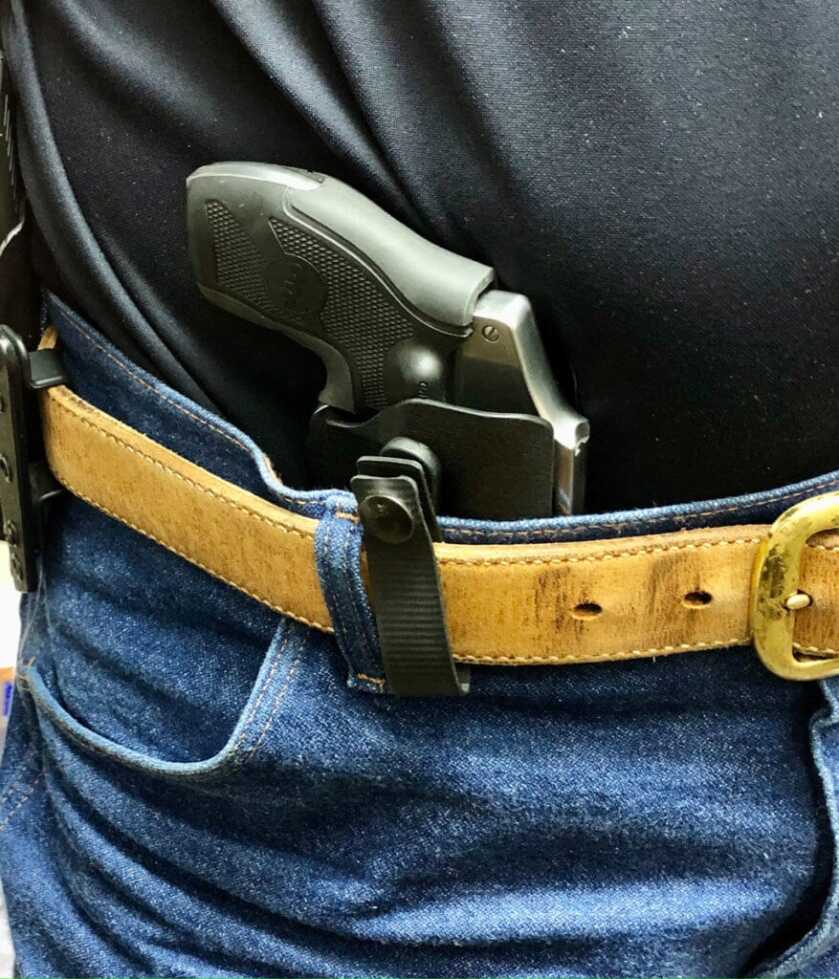
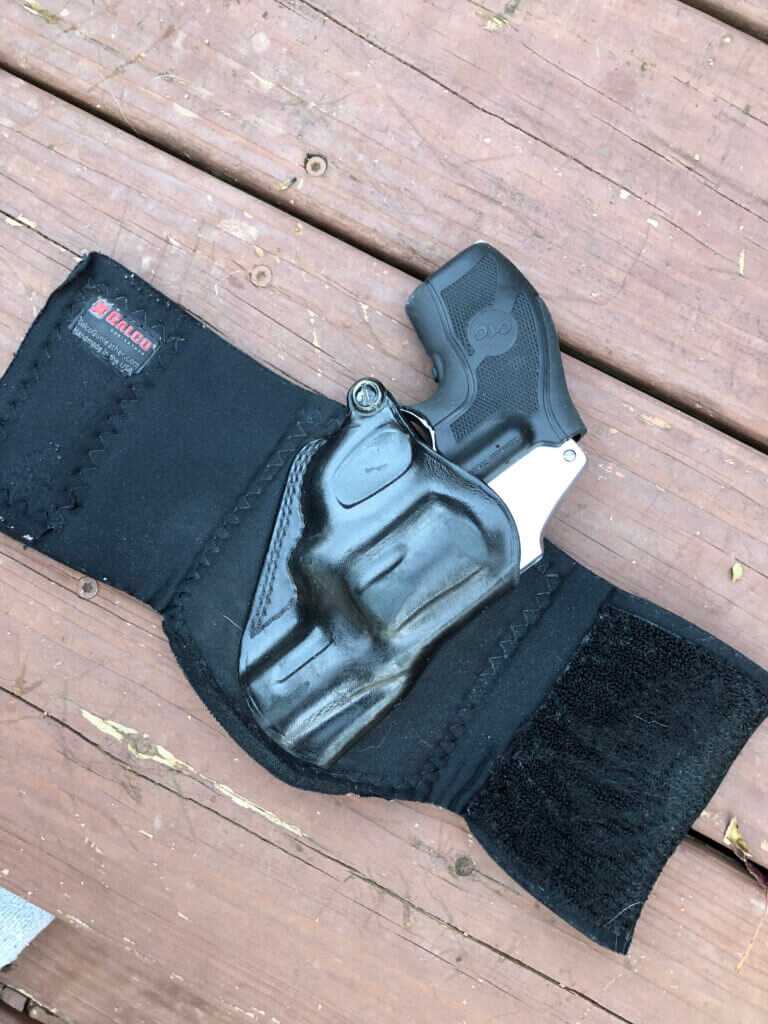
In the end, the Model 640 proved to be a solid performer. The stainless construction, combined with the longer barrel, made the 640 significantly easier to shoot when compared with the alloy guns. My friends have told me that I’ve never met a J-frame that I didn’t like. That is not quite the case but certainly, the new 640 has a lot to offer.
Specifications
SKU: 163690
Model: Model 640
Caliber: .357 Magnum
Capacity: 5
Barrel Length: 2.125”
Overall Length: 6.6″
Front Sight: Pinned Black Ramp
Rear Sight: Fixed
Action: Single/Double Action
Grip: Synthetic
Weight: 22.1 oz.
Cylinder Material: Stainless Steel
Barrel Material: Stainless Steel
Frame Material: Stainless Steel
Frame Finish: Satin Stainless
MSRP: $755.00
Note: The historical information contained in this article came from History of Smith & Wesson by Roy Jinks and Standard Catalog of Smith & Wesson by Jim Supica and Richard Nahas. Any errors are the responsibility of the author and not Supica or Nahas.

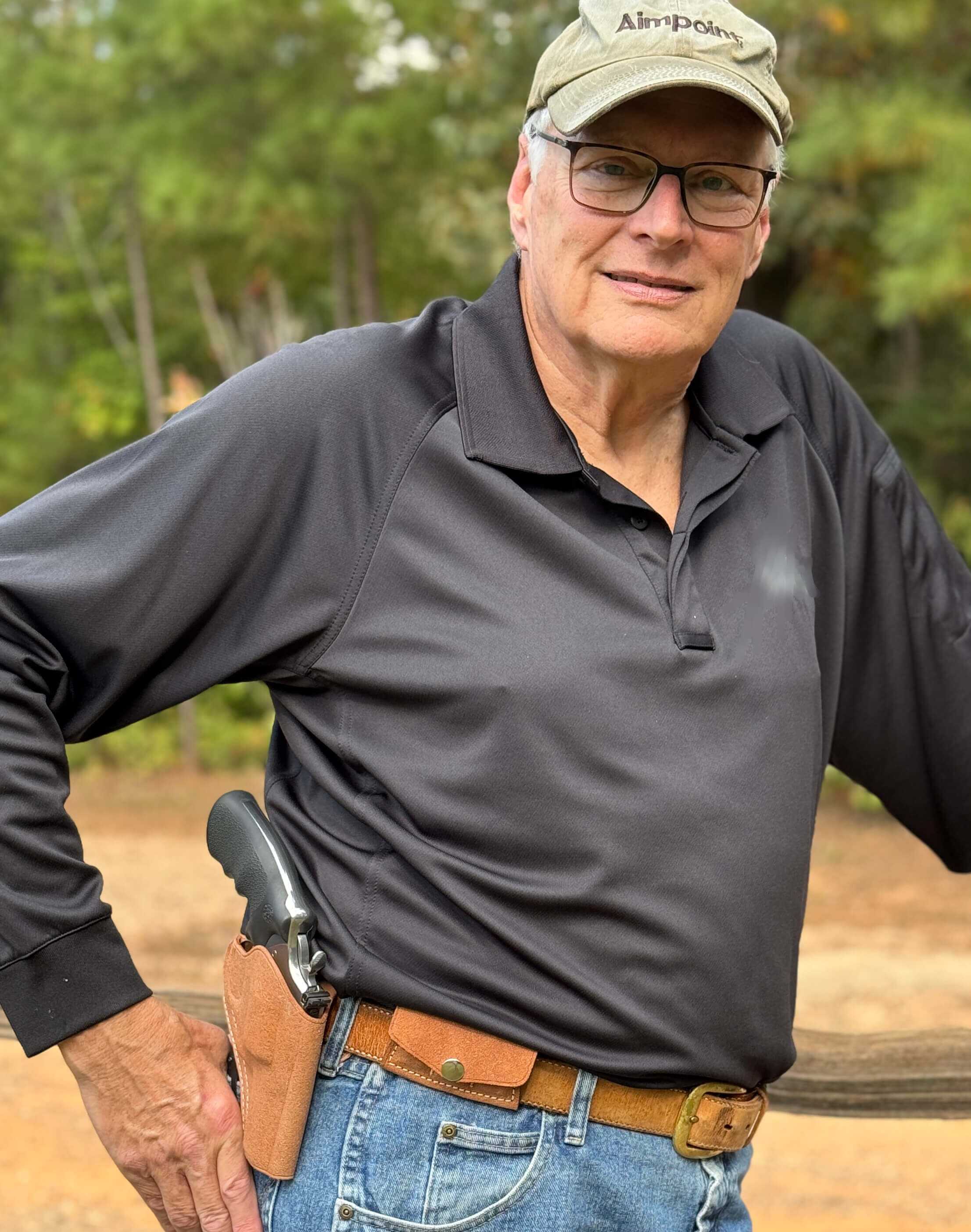
This is what I carry and have carried for several years. I am a senior citizen too but I don’t have any problems with it. I agree, replace the grips with checkered wood and full length. That’s how I can hold it down so it doesn’t flip. I grip it tight! There’s no pain or discomfort if you do that.
When I read a review of a 357 magnum, I expect to see test results using 357 magnum ammo. If I want to read about 38 special test results, I’ll read a test of a 38 special model. I’m in my 60’s, only five and a half feet tall and weigh well under the typical 200 pounds of the average American these days, and I carry and shoot my 640 with Buffalo Bore 125 grain jacketed hollow points exclusively, and it’s far from punishing! I don’t use the fancy grips that come on them either, changing them out for the best grips ever made for these little guns, the original checkered wood type that used to come on the Chief’s Special and others. They’re best for concealed carry and provide the best purchase for shooting the ammo these things were designed for. Stay away from grip adapters on the centennial types as well, they and the fancy grips share the same problem: they force your hand to low on the grip which results in increased muzzle flip and increased felt recoil. Shoot these guns using as high up a hold as possible and you won’t have any problems with magnum loads.
bought my 640-1 in 1997, it was my first carry gun. painted the front sight with Orange Testors model paint to make seeing it easier. Have a Kramer OWB holster for it and it is the best for all day carry year round. run Hornady Critical Defense .357 and recoil is very manageable.
The first 640,s in 89-90 were marked +P+, of coarse chambered in 38 Special. Not a lot of them were marked as such, i believe. Bodyguards weren’t ugly. Just, well, different.
Pass on anything with mim and for sure Pass on Hillary holes by the cylinder release!! I’ll be happy with my 3inch 64 38spl made in the mid 80s. Forged parts and power rib main spring. The trigger is magic. And since I’ve made 38 rounds for over 3decades I know it needs to do the job
Enjoyed the article. One thing though, at least one original 640 was tested for +P+ ammo. It is marked inside the frame below the cylinder. I just looked to be sure I haven’t been wrong for the past 31 years.
Seniors would like a version of a SS 3″ model 638, in .357 mag, with the LG 305 grips. I shoot the SS 3″ model 60 .357 and the current model 638 in .38. The small amount of extra weight, along with a slightly longer barrel, means that I can shot the model 60 much better than the model 638. In either case, the double action trigger pull is a major issue for me to use a “J” frame S&W with any accuracy. Wish I could carry a 9mm or a .45, but as a typical senior citizen, racking the slide is difficult. I can cock the hammer for single action firing on a “J” frame, or still go double action at “belly button” distances. So far, appears only Charter Arms offers a .357 similar to the S&W model 638.
Yes I agree with you. The trigger pull is terribly difficult at over 12Lb. For a senior 70+ to shoot 5 shots of 125 gr. Mag. Hollow points is painful to say the least. Stick with the 38 + P loads for a defensive load.
Today we live in a world where there are endless solutions seeking a problem to solve. You get what you vote for. I hear screams all over about Biden’s actions with fossil fuels and what it has cost this solidly Democratic state.. But he was right out front during the campaign. You vote a party because your father and grandfather did, you deserve what you get. It is just too bad the rest of us suffer with you.
I bought my 640 .38 spl in the mid 90’s, after it was recommended to me by Col Rex Applegate, and have carried it ever since. I carry it IWB/appendix every waking hour that I’m off-duty and will continue until I’m put under. I absolutely love and trust this gun.
From the first moment I dropped a Centennial 642 in my pocket almost 30 years ago, I never looked back. Nothing else, even comes close.
Fun to shoot, but never bet your life on one with the internal lock! Had a 686 with a broken lock right out of the box. It would not fire in certain positions!
Centennial frame revolvers are hard to beat for daily carry. Install a Delta grip to tame heavy defensive loads.
Wouldn’t have a S&W , there not the fire arms they use to be in the passed. Own all you can find.
Regarding the S&W 640: The Performance Center® Pro Series® Model 640 is the one you should have reviewed. First of all, it does not have the horrid “Hillary Hole” since there is NO internal lock. In addition, Tritium Night Sights are standard, and of course, the action is smoother. For a few more dollars, the Performance Center® editions are worth it.
If you look at you will find a review is did on the 640 Pro. It is probably the best revolver Smith makes.
Thanks
Rob
i have a model 640 with the “cen” serial number and it factory rated for +p ammo.
What is the difference between a .38 and the .38 Special cartrige?
Most people these days are thinking 38spl when they say 38.
But the first s&w 38 was shorter brass and a slightly fatter bullet and was called 38s&w.it was used by the British as a military revolver round and they called it 38/200. If you buy a box for your 38spl. It will not chamber.
I would love to have a 357 Bodyguard.
The lock on Smith and Wesson revolvers is the result of the company being sold to the Safe-T-Hammer Corporation in 2001. It was one of the company’s products that they incorporated into all the Smith revolvers. For Smith and Wesson to remove a “safety” device from their products would be like automobile manufacturers taking seatbelts out of cars. It ain’t going to happen.
S&W does not put the “internal lock” on all of its revolvers. I have a Performance Center 640 which doesn’t have it and the M&P 340 – SKU: 103072 – does not have it either. When I had the “internal lock” removed from my Model 19CC, I was shocked to see the cheaply built parts. I replaced the “Hillary Hole” and “internal lock” with the ORIGINAL PRECISION KLN-ORD-BLK Lock Delete® Slug and Retainer Set.
As a retired law enforcement officer I have carried many different small revolvers in both the ankle and waistband configuration.
I lastly carried a SS model 60 with crimson trace grips. This revolver did everything ask of it and then some.
I like seeing new and improved firearms out of Smith as much as the next guy but from my point of view its seem like the fixing of a problem that didn’t exist.
I prefer the K frames with short barrels over the J frames for CC. A early pinned and recessed model19 with a 2 1/2″ barrel is near perfect for me and I still qualify out to 50 yards with one.
Is the 642-1 +P rated
I have always believed S&W produced the best revolvers. Models 10,15 and 66 (my favorite) demonstrated
their reliability after thousands of rounds. S&W has entered the arena of liberals insanity. Why put a safety on
a revolver? Is this a Mexifornia requirement that carried over for the rest of the country? Come on S&W,
offer your fine guns without the safety!
There are several states that require a locking device on a revolver. I believe that California
is one. That’s why it was developed. I have had both a .44 mag and .45 acp revolver that
malfunctioned because of the key lock safety. That why I remove them on my guns.
Many people complain about the safety lock on Smith & Wesson revolvers. I agree that they are unnecessary and represent design by lawyer rather than common sense engineering. However, I have never heard of a problem with the safety lock preventing the gun from firing. I previously owned a S&W revolver with the safety lock and never used it to lock the action, but never had a problem with a lock-related malfunction. That being said, any mechanical device can malfunction, so it’s possible that one might lock the action and then be unable to unlock it when the gun is needed. I wish that S&W would eliminate this device on their revolvers.
Don’t bet your life on a S&W with a internal lock as they malfunction! Purchased a 686 having the lock and it malfunctioned right out the box!
With a shrouded hammer, how can it be a single/double action? Or did I miss something? Also the large gap in the CT grips at the top of the back strap is both ugly and a dirt/shit catcher for sure. I’m retired now but still carry daily and usually an SP101 SS 357 snubby. I live in a rural setting but still have dirt bag concerns so if out working, running a chain saw, crawling about mucking shit or in the shop grinding, or reloading the wife always tells to brush or shake the crap off before coming in. And I’m with the others who con’t buy a colt due to their caving in politically.
I have a model #38 S&W nickel bought in 1964 good Gun I am retired law Enforcement carted every Day.
Get rid of the key lock and offer it 9mm as well
Nice article. Great gun. I was looking at the 640 Pro also. I love the extra weight of a stainless
J frame too. XS sight & CT laser grip is the way to go. I, we have a 442 & 642. Found the 642 in a shop used (barely) with a CT laser grip. They wanted $399. Hell that’s the price of the grip alone!
My daughter carries that now.
I agree on the safety. But I don’t notice it anymore, it never malfunctions, and it never gets used. These are sweet little guns. I cleaned up the trigger a bit and these are very accurate for a short barrel pistol. 357 is a bit much though.
It would be more perfect without the Hillary hole. 😉
I am surprised that S&W can’t/won’t re-engineer their line to remove that “safety”.
Since Smith and Wesson put that idiotic lock on their revolvers, I have gone to Rugers. The fact of the matter is a revolver does not need a safety. It’s just one more thing to malfunction and leave the internal parts subject to dirt and other problems.
The idea behind the lock is so a kid can’t find your revolver and shoot themselves or somebody else by accident. I think they all use the same key so I don’t see how it prevents thieves from wanting to steal them as they can get a key many places. I certainly do not want to have to use anything for my middle of the night emergency piece that requires having a key at hand during an emergency.
I have an S&W .22 with this so called “Hillary Hole” and it works great and has a really good DA and SA trigger. No problems and it has been fired a lot. It has never been locked since it came out of the box at least 15 years ago.